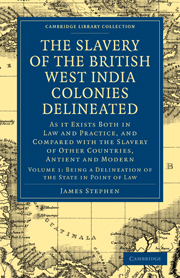 The Slavery of the British West India Colonies Delineated
The Slavery of the British West India Colonies Delineated Book contents
- Frontmatter
- PREFACE
- Contents
- PRELIMINARY CHAPTER: Of the Necessity and Importance of describing the State in question, and the general Plan of the Work
- BOOK I OF THE SLAVERY OF OUR COLONIES CONSIDERED AS A LEGAL INSTITUTION
- CHAPTER I Of the Origin and Authority of the Colonial Slave Laws in general
- CHAPTER II Of the Persons who are subject to Slavery in our Colonies
- CHAPTER III Of the legal Nature and Incidents of this Condition, as they respect and constitute the Relation between the Slave and his Master
- CHAPTER IV Of the legal Nature and Incidents of Colonial Slavery, as they respect its Relations to Persons of Free Condition in general, the Master and his Delegates excepted
- CHAPTER V Of the legal Nature and Incidents of West India Slavery, in its Relations to the Police and Civil Government of the Country
- CHAPTER VI Of this State of Slavery in respect of its Commencement and Dissolution
- Appendix, No. 1
- Appendix, No. II
- Appendix, No. III
- Appendix, No. IV
- Appendix, No. V
CHAPTER III - Of the legal Nature and Incidents of this Condition, as they respect and constitute the Relation between the Slave and his Master
Published online by Cambridge University Press: 07 October 2011
- Frontmatter
- PREFACE
- Contents
- PRELIMINARY CHAPTER: Of the Necessity and Importance of describing the State in question, and the general Plan of the Work
- BOOK I OF THE SLAVERY OF OUR COLONIES CONSIDERED AS A LEGAL INSTITUTION
- CHAPTER I Of the Origin and Authority of the Colonial Slave Laws in general
- CHAPTER II Of the Persons who are subject to Slavery in our Colonies
- CHAPTER III Of the legal Nature and Incidents of this Condition, as they respect and constitute the Relation between the Slave and his Master
- CHAPTER IV Of the legal Nature and Incidents of Colonial Slavery, as they respect its Relations to Persons of Free Condition in general, the Master and his Delegates excepted
- CHAPTER V Of the legal Nature and Incidents of West India Slavery, in its Relations to the Police and Civil Government of the Country
- CHAPTER VI Of this State of Slavery in respect of its Commencement and Dissolution
- Appendix, No. 1
- Appendix, No. II
- Appendix, No. III
- Appendix, No. IV
- Appendix, No. V
Summary
The legal nature of this relation will be best unfolded by distinguishing its principal canons or rules.
RULE I.—BY THE LAW OF THE COLONIES, SLAVERY IS A CONSTRAINED SERVITUDE DURING THE LIFE OF THE SLAVE
As this is a property of the state almost universally belonging to it, and comprised in the most general ideas we form of slavery, it calls for no particular observation.
RULE II.—IT IS A SERVICE WITHOUT WAGES
This, too, is a property which the term in its most ordinary signification implies, though even in this respect the slavery of the West Indies is distinguishable, to its disadvantage, from some states of man, from which it has been fallaciously represented to derive countenance and example.
RULE III.—THE MASTER IS THE SOLE ARBITER OF THE KIND, AND DEGREE, AND TIME OF LABOUR, TO WHICH THE SLAVE SHALL BE SUBJECTED; AND OF THE SUBSISTENCE, OR MEANS OF OBTAINING A SUBSISTENCE, WHICH SHALL BE GIVEN IN RETURN
The propositions contained in this rule may most conveniently be stated and proved together, since raising his own food, is commonly part of the labour of the slave.
That the rule is true in all its parts, has been fully admitted by the colonists and their witnesses, in respect of their system anterior to 1788—i. e. prior to the temptation which parliamentary discussions on the Slave Trade presented to the colonies, to disguise the true nature of their interior policy.
- Type
- Chapter
- Information
- The Slavery of the British West India Colonies DelineatedAs it Exists Both in Law and Practice, and Compared with the Slavery of Other Countries, Antient and Modern, pp. 33 - 128Publisher: Cambridge University PressPrint publication year: 2010First published in: 1824


